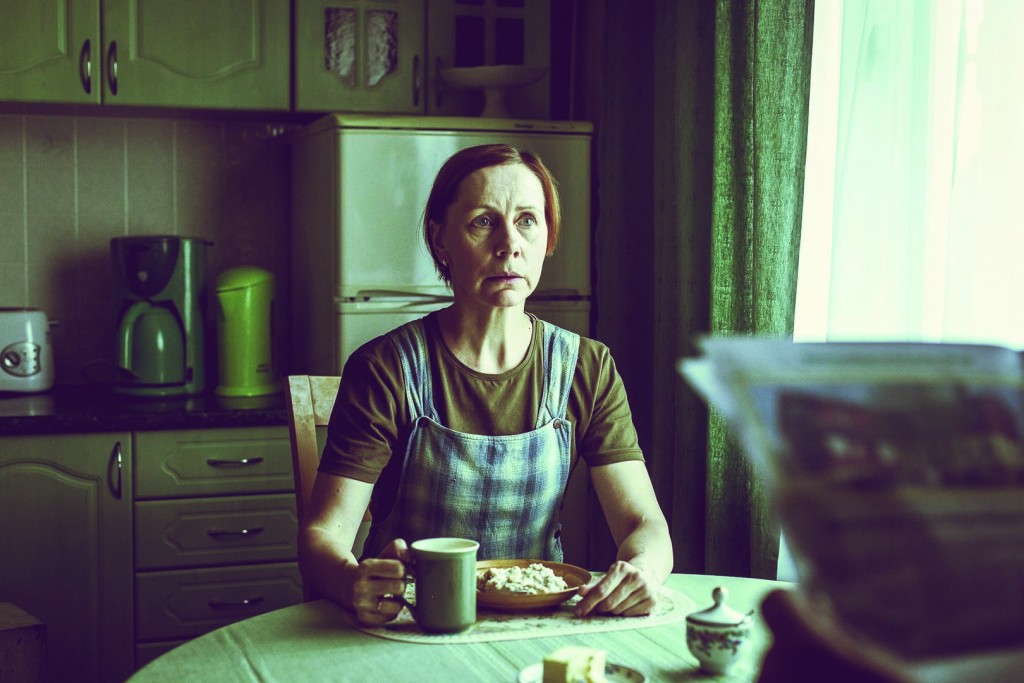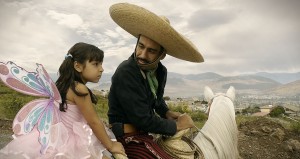
By Gary M. Kramer.
The 2016 Tribeca Film Festival, April 13-24, showcased more than 100 features and nearly 75 shorts from 42 countries. The documentaries and foreign films were strongest. Here are reviews of six films—three features, and three documentaries—that were among the more interesting and ambitious films to play at this year’s fest.
The intriguing Estonian film, Mother, directed by Kadri Kõusaar, is a modest drama masquerading as a mystery. Lauri (Siim Maaten), a teacher, lies in a coma, having recently been shot. His mother, Elsa (Tiina Mälberg) relentlessly cares for him along with the house, cooking and cleaning. She patiently allows Lauri’s friends, girlfriends, students, and co-workers to stop by at their convenience to pay him a visit. Through the small town’s policeman (Jaan Pehk), Elsa learns that before he was shot, Lauri withdrew a large sum of money. As visitors come and go and return, secrets are exposed. Elsa soon makes some calculated decisions about her life. It would spoil Mother to reveal more regarding this tautly constructed story, although for some viewers, it might feel as if a key twist comes too soon. That said, the strength of this film is not just in the committed performance by Mälberg, who makes Elsa’s quiet pain palpable, but also Maaten’s remarkable portrayal as Lauri, the comatose man. The film’s mordant humor—and tension—stems from the suggestion that Lauri is on the verge of reacting to his visitors at any given moment. Viewers will likely respond with enthusiasm.
Another film that features comedy and tension is Karl Mueller’s Rebirth, which has Kyle (Fran Kranz) eking out a routine existence as a social media manager for a bank. That is, until his college buddy, Zack (Adam Goldberg) turns up unexpectedly and encourages him to “stop being boring,” attend “Rebirth,” and “have an experience.” Kyle reluctantly agrees, and finds himself puzzling through a strange maze of clues and absurdist encounter groups, which range from violent to sexual. All of which make Kyle become slightly more uncomfortable and unhinged. The film addresses issues of free will and how people create boundaries, as well as issues of judgment and honesty, but Rebirth boxes itself into a corner with various reveals that disturb Kyle, but barely register with viewers. Alas, this mild film’s effort to walk the tightrope between humor and thriller compromises the film’s power as the fear of a loss of control or money, become jokey, and the satire of the Rebirth cult/encounter groups is never frightening enough.

Another disappointing indie drama was The Ticket, which opens with voices talking, as viewers are kept mostly in the dark—not unlike the film’s blind protagonist, James (Dan Stevens). Then, suddenly, images shift into focus. James can finally see. The pituitary tumor that was causing his blindness shrank. It’s a miracle the doctors can’t explain. The Ticket portrays how James reacts to his new sight, which prompts him to start having a better life. He buys powers suits and gets a promotion at the realty office where he works. He takes on the principal at the school where his son is being bullied. He buys a new car his protective wife Sam (Malin Ackerman) is concerned about him driving. Stevens is best when he expressively takes the world in—staring into the mirror at himself, or watching people a dance hall where his wife first met him. But then he changes.
The Ticket is a commentary on James’ ambitions and yet, his life as a blind man was, as viewers clearly see, not so terrible: He has a wife and son who love him, a loyal best friend and a good job. The metaphor-heavy film suggests—in its facile morality—that James ruins everyone’s lives once he has sight. It’s a potentially interesting inversion of the disability narrative, because the hero loses his disability but gains another problem. However, writer/director Ido Fluk doesn’t investigate the complexity of the premise nor does he give the characters much nuance. Moreover, the forced and unsurprising come-uppance does the film another disservice.
There were two notable non-fiction films from Latin America that depict the lives of men with HIV/AIDS at the festival this year. The moving documentary, Memories of a Penitent Heart, opens with a question: If we only remember the good things about people we love, what do we lose? This heartfelt film by Cecilia Aldarondo, is an effort to understand the life and death and family legacy of her gay uncle, Miguel, who died of AIDS in 1987. Aldarondo’s grandmother, Carmen, a devoutly religious woman, strongly disapproved of her son Miguel’s sexuality. She froze out Miguel’s lover, Robert, and it appears, Cecilia’s mother, Nylda, may have as well. In the film, Aldarondo reconnects with Robert after thirty years, and in the process, uncovers family tensions and long-kept secrets that may explain, and perhaps even justify, reasons for the family’s chilly behavior towards Miguel, and by extension, Robert.
Memories of a Penitent Heart deftly uses footage, interviews, and touching letters to create a three-dimensional portrait of Miguel and his relationships. But what makes the film resonate is how Aldardono questions Miguel’s identity. He renames himself Michael in New York after moving to the States from Puerto Rico; has moments of self-loathing; dresses in leather; and feels hatred towards his family. These clear emotions are contrasted with Robert’s anger toward Miguel and his relatives, as well as Carmen and Nydla’s conflicted feelings towards their son and brother, respectively. What emerges is a compelling story in which Aldarondo tries to mete out justice for her uncle, only to confront a far more complex and stirring history of family life and beliefs that she, or the viewer, might expect.

In contrast, José Villalobos Romero’s observational documentary, El Charro de Toluquilla, concerns Jaime García, a mariachi singer who jokes about his HIV status. Admitting he had a wild life when he was 28-32, the charismatic García is trying to grow up as he nears 50. He talks about living well with no worries, and opines about love. Yet he seems to care more about his horses than his girlfriend Rocío. She won’t live with him until they get married, and Rocío is protective of Analía, the young daughter the couple had together. (Significantly, neither Rocío and Analía have HIV).
The film shows García at his best—performing as a drunk at the bar where he works—at his worst—fighting with Rocío in the car—and caring for his daughter. He is also seen on the toilet, at the dentist, answering his constantly ringing cell phone, and even vomiting in the streets. The film’s authenticity is its best asset; its view of García and his family is unfiltered, and it shows how he is fighting against time to find the good in his life. That he may be his own worst enemy is one of the salient points of the film. García, who performs as “El Charro de Toluquilla,” and shouts, “Viva Toluquilla!” from time to time, is a character one could not make up in fiction. And his energy also makes the film worthwhile.
Another strong documentary was Jeremiah Tower: The Last Magnificent about the “first celebrity chef.” This engaging, sympathetic film chronicles the way Tower’s childhood of privilege gave way to his becoming one of the great chefs in new American cuisine. Of course, his story has its ups and downs, from his rocky relationship with his parents—he blames them for not making him an orphan—to his battles with Chez Panisse’s Alice Waters and others as he rose to prominence in the California restaurant scene. If Tower’s food represented his idealized dreams of elegance and luxury in a bohemian world, he answered his critics when his restaurant Stars created excitement beyond the food. Although he is a gay man, (and attractive to everyone, it seemed) Tower was sued for AIDS bias and discrimination by an employee an ugly episode awkwardly shoehorned into the film. Better are the points about Tower being a control freak, most prominently displayed when he comes out of retirement to work at the troubled reinvention of Tavern on the Green. If the insights about Tower’s life and personality, recounted by his various friends and colleagues, including Ruth Reichl and Anthony Bourdain are tasty bon mots, it is Tower’s own self-examination that make this film savory.
Gary M. Kramer is the author of Independent Queer Cinema: Reviews and Interviews, and co-editor of the recently published Directory of World Cinema: Argentina.
For more on the Tribeca Film Festival, see Michael Miller’s festival report here.

Gary, A nice succinct summing up of this year’s Tribeca Festival. Having had the opportunity to watch Kõusaar’s Mother, you have offered a finely written short summary. As you say people should approach Mother knowing as little about it the plot as possible, in order to allow the film to make an impression. Kõusaar has said: “Its tragicomic tones evoke the Coen brothers’ FARGO – a specific small-town atmosphere where a desperate soul attempts to carve out a better life.” Here may lie reason to be impressed because in no way did it strike me as a film that fell into the trap of imitation. Rather it managed to belong to and add to the diversity of small-town stories with a unique presence. There is of course the question whether Mother’s all female creative team (written by Leana Jalukse and Al Wallcat (producer Aet Laigu’s alter ego)) should be played upon? Having spoken to Jalukse and Laigu they feel that the female point of view was integral to the film, and perhaps poses the question that if we want to infuse archetypal stories with more creativity, rather than just pushing at the narrative boundaries could more opportunities for women writers, directors and producers bring us something that has been lacking or rather for the most part missing?
Thank you Gary for this Review. Having El Charro as his own worst enemy is one of the most difficult things to build during editing. I am glad you can accurately detect this. I am not good expressing myself in english. But I am really thankful about this review. You got here my email contact. Best wishes. José Villalobos R. Director.